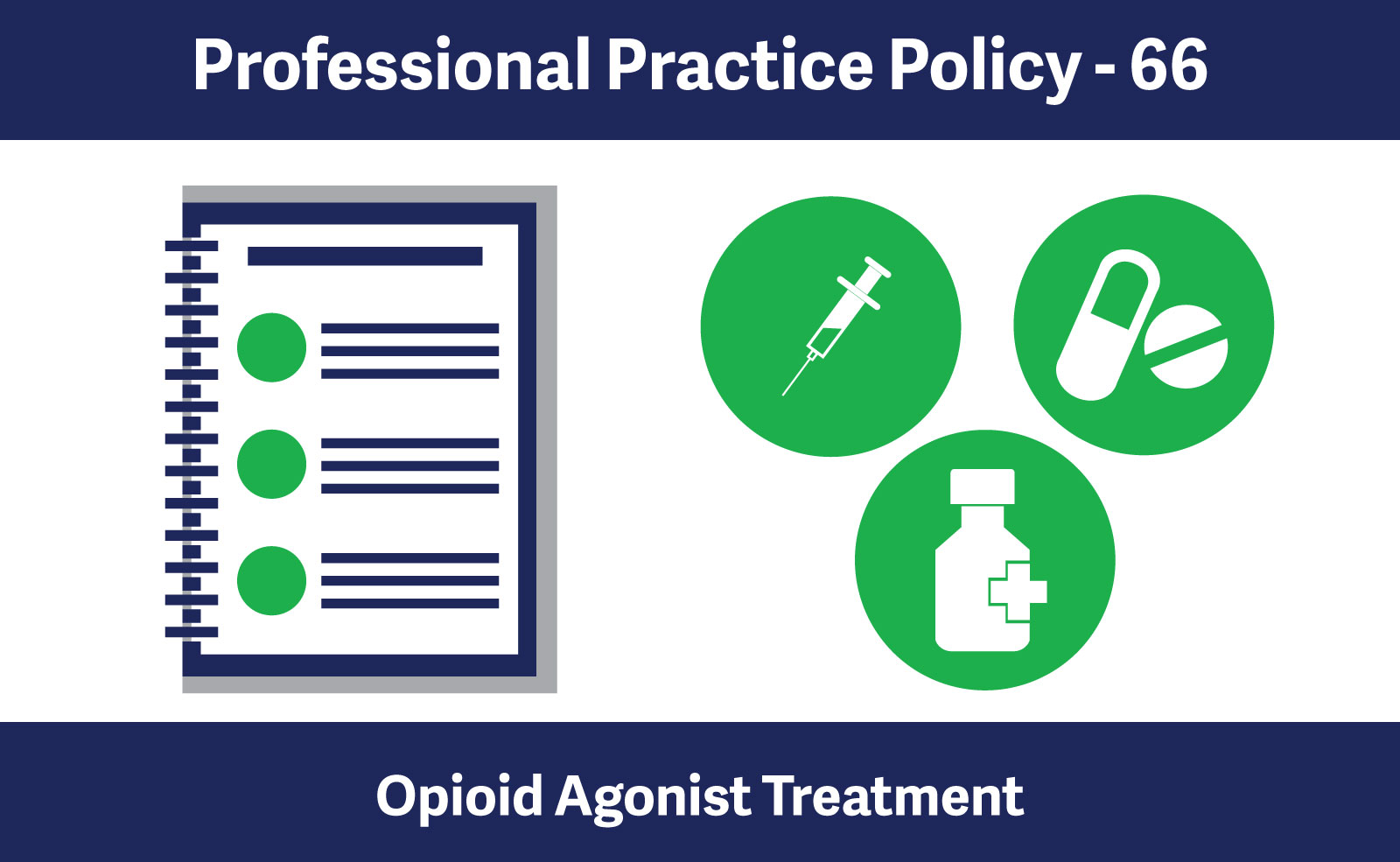New Opioid Agonist Treatment Policy Coming Soon
On January 1, 2018, amendments to Professional Practice Policy – 66, including changing its name from “Methadone Maintenance Treatment” to “Opioid Agonist Treatment,” come into effect. These amendments also include the introduction of new policy guides for buprenorphine/naloxone, and slow-release oral morphine.
On June 5, 2017, the BC Centre on Substance Use (BCCSU) released new Provincial Guidelines for the Clinical Management of Opioid Use Disorder. The new guidelines recommend buprenorphine/naloxone as the preferred first-line Opioid Agonist Treatment (OAT) for opioid use disorder. Methadone remains a first line option when buprenorphine/naloxone is contraindicated or unfeasible, and slow-release oral morphine (SROM) may be used when both the first and second-line treatments are ineffective. This guideline will serve as the provincial clinical practice guideline for all clinicians who wish to prescribe oral OAT to patients with opioid use disorders.
While the College currently has requirements in place for methadone as an OAT drug, new policy guides - Buprenorphine/Naloxone Maintenance Treatment and Slow Release Oral Morphine Maintenance Treatment, have been developed to support the new clinical guidelines.
To ensure these drugs are safely dispensed for patients, the College worked with the BCCSU and others to develop requirements for dispensing slow-release oral morphine and buprenorphine/naloxone which now complement the existing requirements for dispensing methadone.
Opioid Agonist Treatment
OAT is an effective treatment for addiction to opioid drugs such as heroin, oxycodone, fentanyl and Percocet. The treatment involves taking opioid agonists such as methadone, buprenorphine/naloxone or slow-release oral morphine in order to prevent withdrawal and reduce cravings for opioid drugs.
These medications have been shown to help people with opioid addictions stabilize their lives and reduce the harms related to their drug use.
New Opioid Agonist Policy
At its November 2017 meeting, the College Board approved amendments to Professional Practice Policy -66: Methadone Maintenance Treatment, including renaming the policy to “Opioid Agonist Treatment”.
The policy has been updated to align with the new Provincial Guidelines for the Clinical Management of Opioid Use Disorder developed by the BC Centre on Substance Use, and sets out requirements for safe dispensing of drugs used to treat opioid use disorder.
Amendments to the policy come into effect on January 1, 2018
Review the amendments Professional Practice Policy-66 below:
|
Professional Practice Policy-66: Opioid Agonist Treatment (Effective January 1, 2018) |
New Policy Guides for Buprenorphine/Naloxone and Slow Release Oral Morphine
As part of the amendments to Professional Practice Policy-66, the College developed new policy guides- Buprenorphine/Naloxone Maintenance Treatment and Slow Release Oral Morphine Maintenance Treatment. The existing policy guide for Methadone Maintenance Treatment was not changed and is still in effect.
The policy guides for Buprenorphine/Naloxone Maintenance Treatment and Slow Release Oral Morphine Maintenance Treatment include many of the same as the requirements as the policy guide for Methadone Maintenance Treatment.
Key differences between the policy guide for Methadone Maintenance Treatment and the new policy guides include:
- Duplicative requirements from existing legislation were not included (e.g. privacy and confidentiality requirements which are already requirements in the Health Professions Act Bylaws, Schedule F-Standards of Practice, Part 1 – Community Pharmacy);
- The regular Controlled Prescription Form will be required, and not the Methadone Controlled Prescription Form (which is specific to methadone);
- Faxed Controlled Prescription forms are not accepted with slow-release oral morphineand buprenorphine/naloxone, in accordance with the Controlled Prescription Program; and,
- Alterations to the Controlled Prescription forms are not accepted with slow-release oral morphine and buprenorphine/naloxone, in accordance with the Controlled Prescription Program.
Review the two new policy guides below:
|
PPP-66 Policy Guide: Slow Release Oral Morphine Maintenance Treatment (2018) (Effective January 1, 2018) |
|
PPP-66 Policy Guide: Buprenorphine/Naloxone Maintenance Treatment (2018) (Effective January 1, 2018) |
RESOURCES
- A Guideline for the Clinical Management of Opioid Use Disorder (BCCSU)
- Webinar: Provincial Guidelines for the Clinical Management of Opioid Use Disorder (BCCSU)
- BC Center for Substance Use Education and Training
- Did you know? Buprenorphine/Naloxone (BCCSU)
- Did you know? Slow-release oral morphine (BCCSU)
- Frequently Asked Questions Buprenorphine/Naloxone Treatment (BCCSU)
- BC Center For Substance Use ReadLinks Series
- How to use Naloxone to Save a Life
- Opioid Agonist Treatment, Opioids

 Share
Share






